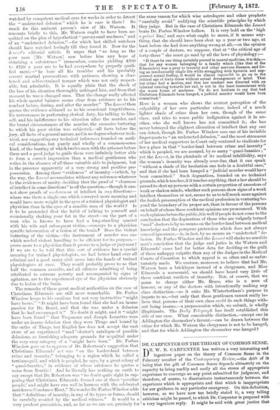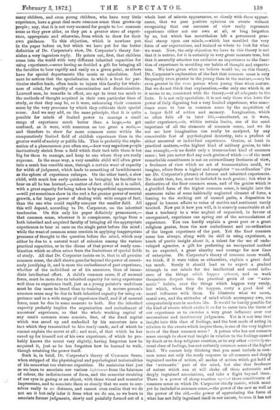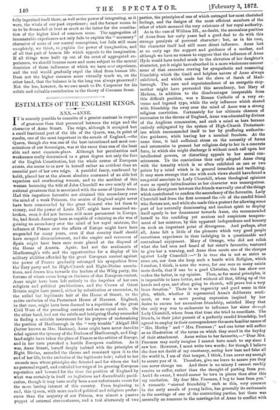DR. CARPENTER ON THE THEORY OF COMMON SENSE.
DR. W. B. CARPENTER has written a very interesting and ingenious paper on the theory of Common Sense in the February number of the Contemporary Review,—the drift of it being that the gift of Common Sense depends ultimately on the capacity to bring readily and easily all the stores of appropriate experience to converge on any point submitted for judgment, and therefore, of coarse, to discriminate instantaneously between the experience which is appropriate and that which is inappropriate for our guidance in any particular emergency. On this definition, however, as we have now too briefly stated it, a very telling criticism might be passed, to which Dr. Carpenter is prepared with a very ingenious reply. It might be said with great justice that many children, and even young children, who have very little I experience, have a great deal more common sense than grown-up people ; nay, that it is not very unusual for people to lose common sense as they grow older, as they get a greater store of experi- ence, appropriate and otherwise, from which to draw for their own guidance. To this objection, which is nowhere put in the paper before us, but which we have put for the better definition of Dr. Carpenter's view, Dr. Carpenter's theory fur- nishes a very ingenious reply. He points out, first, that children come into the world with very different inherited capacities for using experience,—some having as decided a gift for bringing all the faculties to bear rapidly and easily on a given point, as others have for special departments like music or calculation. And next he notices that the specialization to which a bent for par- ticular studies leads, often tends to injure this faculty for whole- ness of mind, for rapidity of concentration and discrimination. Learned men, he remarks in effect, are apt to trust too much to the methods of thought acquired in their own particular lines of study, so that they may be, as it were, unlearning their common sense by the very processes by which they cultivate their special sense. And we may add, on the same principle, that it is quite possible for minds of limited power to manage a small range of experience much better than a large,—to get confused, as it were, with resources on too great a scale,— and therefore to show far more common sense within the comparatively limited field of childish experience than in the greater world of society or public life. That is probably the expla- nation of a phenomenon you often see,--how very sagacious people instinctively shrink from a field which their tact tells them is too big for them to manage, and keep to one where they are really supreme. In the same way, a very sensible child will often grow into a much less sensible man, through a certain want of capacity for width of judgment, which leads to something of bewilderment as the sphere of experience enlarges. On the other hand, a slow child, with much less early quickness in bringing his faculties to bear on all he has learned,—a matter-of-fact child, as it is called, with a great capacity for being taken in by superficial appearances, —will yet sometimes show in the end a far greater power of mental growth, a far larger power of dealing with wide ranges of fact, than the one who could rapidly conquer the smaller field. All this will depend, according to Dr. Carpenter, on the inherited tendencies. On this only his paper definitely pronounces,— that common sense, wherever it is conspicuous, springs from a both inherited and acquired faculty of bringing all the appropriate experiences to bear at once on the single point before the mind; while the want of common sense consists in applying inappropriate processes of thought to the question before the mind, which may either be due to a natural want of cohesion among the various practical capacities, or to the disuse of that power of ready com- bination which so often arises from the limitations of special fields of study. All that Dr. Carpenter insists on is, that in all genuine common sense, the skill shown goes far beyond the power of consci- ously justifying it, and is more the embodiment of past experience, whether of the individual or of his ancestors, than of imme- diate intellectual effort. A child's common sense, if of unusual force, must be more due to inherited capacity for using experience well than to experience itself, just as a young pointer's usefulness must be due more to breed than to training. A mature person's common sense may be due to both inherited capacity for using ex- perience and to a wide range of experience itself, and if of unusual force, must be due in some measure to both. But the inherited capacity probably implies the organization and embodiment of ancestors' experience, so that the whole working capital of any man's common sense consists, first, of the fixed capital which was saved up and embodied by his ancestors into a tact which they transmitted to him ready-made, and of which he cannot explain the secret at all ; and next, of that which he has saved up for himself out of his own experience, of which he pro- bably knows the secret very slightly, having forgotten how he acquired it, just as he has forgotten how he learned to walk, though retaining the power itself.
Such is, in brief, Dr. Carpenter's theory of Common Sense, when stripped of the physiological and psychological technicalities of his somewhat too abstruse exposition. He maintains that just as we learn to associate our various inferences from the faintness of colour, the indistinctness of form, and the muscular straining of our eyes in gazing at an object, with those visual and muscular impressions, and to associate them so closely that we seem to our- selves really to see distance, and cannot even realize that we do not see it but only infer it from what we do see, so we learn to associate former judgments, slowly and painfully formed out of a whole host of minute appearances, so closely with these appear- ances, that we pass positive opinions on events without recognizing that our sureness of view really represents experience either not our own at all, or long forgotten by us, but which has nevertheless left a permanent prac- tical stamp upon our minds,—which has moulded the very form of our expectations, and trained us where to look for what we want. Now, the only objection we have to this theory is not that it is untrue, for it is certainly in very great measure true, but that it assuredly attaches too exclusive an importance to the func- tion of experience in moulding our habits of thought and expecta- tion. We have given what we believe would be, on this theory, Dr. Carpenter's explanation of the fact that common sense is very frequently even greater in the young than in the mature,—may be even greater in the same person when young than when mature. But we do not think that explanation,—the only one which is, as it seems to us, consistent with the theory,—at all adequate to the facts. It is not only specialists, it is not only those who have the power of fully digesting but a very limited experience, who some- times seem to lose in common sense by the acquisition of a larger field of action and memory. Imagination, which so often falls off in later life,—smothered, as it were, under experience,—is, within certain limits, one of the most important of all the elements of common sense, and we do not see how imagination can really be analyzed, by any conceivable feat of psychological dexterity, into a product of either ancestral or individual experience. Genius, at least in practical matters,—the highest kind of military genius, to take one example,—is no doubt only a transcendent kind of common sense ; but you never find any such genius of which one of the most remarkable constituents is not an extraordinary freshness of view, a freshness of view which no art of transmutation could, we imagine, educe from a higher and completer " co-ordination " (to use Dr. Carpenter's phrase) of former and inherited experiences. No doubt that, too, must be included in such genius ; but what is distinctive of the finer common sense, and of the genius which is a glorified form of the higher common sense, is insight into the enormous value of some habitually neglected element of force, a leaning to the striking out of unused paths, a disposition to appeal in human affairs to veins of motive and sentiment rarely touched. Now put it how you will, it is scarcely conceivable at all that a tendency to a wise neglect of organized, in favour of unorganized, experience can spring out of the accumulations of experience. You can hardly explain a great poet or a great religious genius, from the new embodiment and co-ordination of the largest experience of the past. Yet the finer common sense has always, along with its skill in using experience, a touch of poetic insight about it, a talent for the use of unde- veloped agencies, a gift for preferring an unexpected method to an expected, a great alacrity and courage for new lines of enterprise. Dr. Carpenter's theory of common sense would, we think, if it were taken as exhaustive, explain a great deal too much. Surely it should lead us to expect a gradual triumph in our minds for the intellectual and moral influ- ence of the things which happen oftenest, and so work themselves deepest into the practical grain of our " auto- matic " habits, over the things which happen very rarely, but which, when they do happen, carry a good deal of moral influence with them. To illustrate what we mean, moral awe, and the attitudes of mind which accompany awe, are comparatively rare in modern life. It would be hardly possible for the kind of events which excite it so far to enter into the tissue of our experience as to exercise a very great influence over our unconscious and involuntary judgments. Yet is it not true that insight into this class of feelings, and the best mode of acting in relation to the events which inspire them, is one of the very highest tests of the finer common sense ? A person who has not common sense enough to show real insight in relation to the feelings caused by death or to deep religious emotion, or to any other relatively un- usual class of feelings, has not certainly common sense of the higher kind. We cannot help thinking that you must include in com- mon sense not only the ready response to all common and deeply ingrained modes of action, all modes of action which get hold of the 'automatic' part of the mind, but also that freshness of nature which can at will shake off these automatic and deeply ingrained associations, and take a flight beyond them. There is a power of sharp reaction against those constituents of common sense on which Dr. Carpenter chiefly insists, which must yet be included in common sense,—the power of the new as well as the power of the old,—the power of appreciating the force of what has not fully ingrained itself in our nature, because it has not








































 Previous page
Previous page